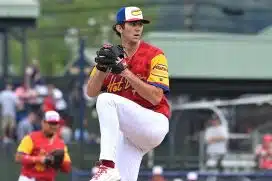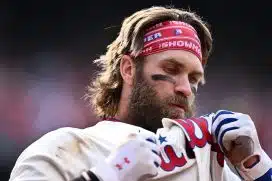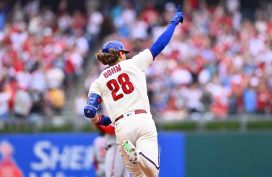By Tim Kelly, Sports Talk Philly editor
2018 was Curt Schilling's sixth and second most successful year on the Baseball Hall of Fame ballot, as he received 51.2 percent of the vote. Still, Schilling, who is beginning to run short on time on the ballot, fell short of being in the 2018 Hall of Fame class.
Schilling's percent falls just short of the 52.3 percent of the vote that he received in 2016, his highest vote total to date. His 2018 total is a 6.2 percent increase over the 45 percent of the vote that he dipped to in 2017.
Critics of Ryan Thibodaux's ballot tracker will swoon over the results that Schilling ultimately received. As recently as today, it appeared extremely likely that Schilling would set a new high in terms of vote totals. That didn't happen, perhaps because those who planned to vote against Schilling didn't make their votes public for fear of being criticized.
Whether Schilling ever gets into the Hall of Fame or not remains to be seen. But his numbers suggest he belongs in.
Though Schilling's 216 wins don't jump off the page, some of his advanced numbers do. His 64.5 JAWS – a statistic that compares candidates to those already in the Hall of Fame at their position, is better than the average Hall of Fame starting pitcher. His JAWS is better than Hall of Famers Tom Glavine, Nolan Ryan, Jim Palmer and Juan Marichal, among others. Schilling's 79.9 bWAR tops the average Hall of Fame starting pitcher's bWAR of 73.9 by a comfortable margin. Here's a list of current/recently retired stars who have a lower bWAR than Schilling: Justin Verlander, CC Sabathia, Roy Halladay, Johan Santana, Andy Pettitte and John Smoltz. His 49.0 WAR 7 – which, in an oversimplified world, measures a player's seven peak years – is nearly equal to the 50.3 average of Hall of Fame starting pitchers.
Additionally, Schilling is one of the greatest postseason pitchers in the history of the sport. For Schilling, who pitched in the World Series for three different teams, his postseason success should serve as the cherry on top of his Hall of Fame candidacy. In 19 career postseason starts, Schilling went 11-2 with a 2.23 ERA and a 0.97 WHIP, while throwing four complete games, two of which were shutouts.
How Schilling performs on the 2019 ballot will be interesting to see. There isn't a presidential election in 2018, but there are midterm elections. Schilling, as is his right, figures to be very outspoken next year. Should someone's political and social views affect whether people vote for them to go into the Baseball Hall of Fame? No, but that's not really the point. It wasn't a coincidence that Schilling saw a seven-percent decrease in the amount of votes he got in 2017, as compared to 2016.







